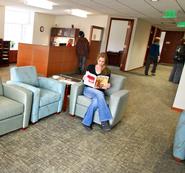
Some in the media would have their audiences believe that a major in English, creative writing or comparative literature may render a college grad unemployable. As was evidenced in a discussion with recent graduates on Feb. 24, that perspective is quite off the mark.
The Career Center held an alumni panel in conjunction with these departments to debunk this belief, bringing Courtney Fitch Hirshey ’03, Andy Berman ’06, Alyssa White ’11 and Greg Leiman ’07 back to the Hill to talk about what they have done with their respective degrees.
Alyssa White is a professional development writer at North Star Academy Charter School of Newark.
“I write books that serve as instructional manuals for teaching,” she explained. Originally, White had set her mind on a teaching career, but when she applied for the position, her skill set lent itself to a writing job.
“I got the job largely because I was a creative writing major,” she said.
During her time at Hamilton, White regularly attended Womyn’s Center meetings. She also spent a summer working in a garden and teaching young children about plant biology in Los Angeles. At the time, she didn’t think too much about what these activities said about her, but when she started applying for jobs, White was “shocked by how relevant [her] employers found [her] experience.”
“All of a sudden, I was this writer who cared about social justice and was self-motivated,” she said.
“My job is particularly rewarding to me because it combines something I love doing—writing—with something else I’m really passionate about: education reform,” she added. “It’s a lot more than I expected from a job right out of college.”
As a freelance editor at W. W. Norton & Company, Courtney Fitch Hirshey has been able to balance her two academic areas of study—English and music—with the newest, toughest job she has taken on to date: being a mom. “Motherhood is frying my brain,” she said.
She got her “foot in the door” at Norton when she landed an internship with the company the summer before her senior year and has been with Norton for seven and a half years.
Fitch Hirshey said the most gratifying part of her job is that “after all the blood, sweat and tears, you have a five-pound book to put on your desk”—a concrete product of all the hard work editing entails. She typically works on “very detailed projects” but doesn’t have to “worry about the rest of the stuff” involved in publishing a book. In a way, she said, her position allows her to wear “blinders.” However, surprises and distractions present themselves in her days, as they do in most everyone’s.
“I could never close my door for eight hours, work on one thing and go home,” she said. “But I don’t know if anyone in any industry can.”
Certainly, the business world is full of day-to-day inconsistencies. People wouldn’t typically consider an English major a logical path to a job in sales. But for Andy Berman, who has worked in digital sales at CNN.com, BBC.com and Facebook, the humanities were instrumental to achieving success in business.
“Learning how to write was probably the most important thing I took away from my English major,” he said.
Berman said that his position in marketing at Facebook varies a lot from day to day but that he travels frequently and attends a lot of meetings. “You might not have a job that has a one-to-one correlation with what you like to do,” he said. But if your work covers a few of your interests, he continued, “you’ll be happy.”
Another unexpected outcome is Greg Leiman’s: He works for the Federal Bureau of Investigation after having majored in comparative literature at Hamilton.
When asked what a typical day on the job is like, Leiman responded, “I’m trying to think about what I can talk about,” given the high level of confidentiality his job requires.
Leiman likened writing case reports to doing any kind of research and subsequently summarizing it, as college students are often asked to do. “What you take away from this place really speaks for itself,” he said. “Good writing is good writing.”
Leiman had some advice for all of the students present, especially pertinent to the seniors. “Don’t take the first job offered to you,” he said. “Consider things that you wouldn’t otherwise go into.”
“But, on the other hand,” White said. “If you love something, do it.”
